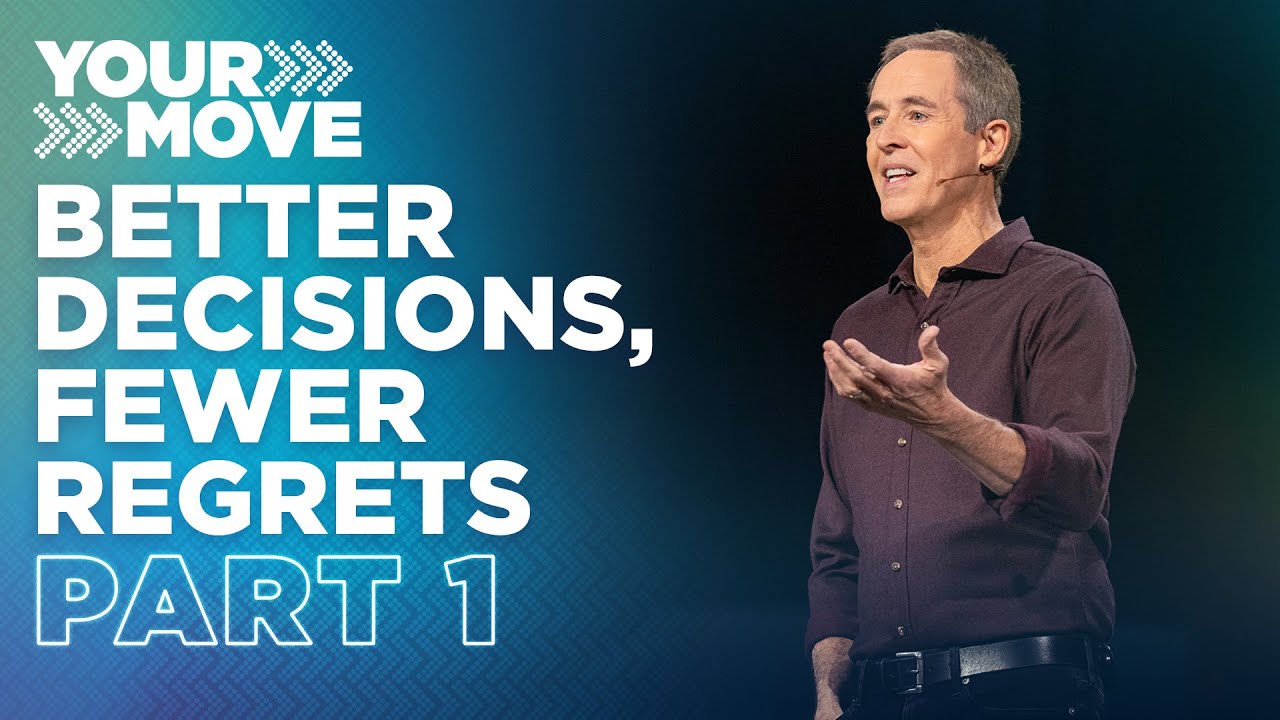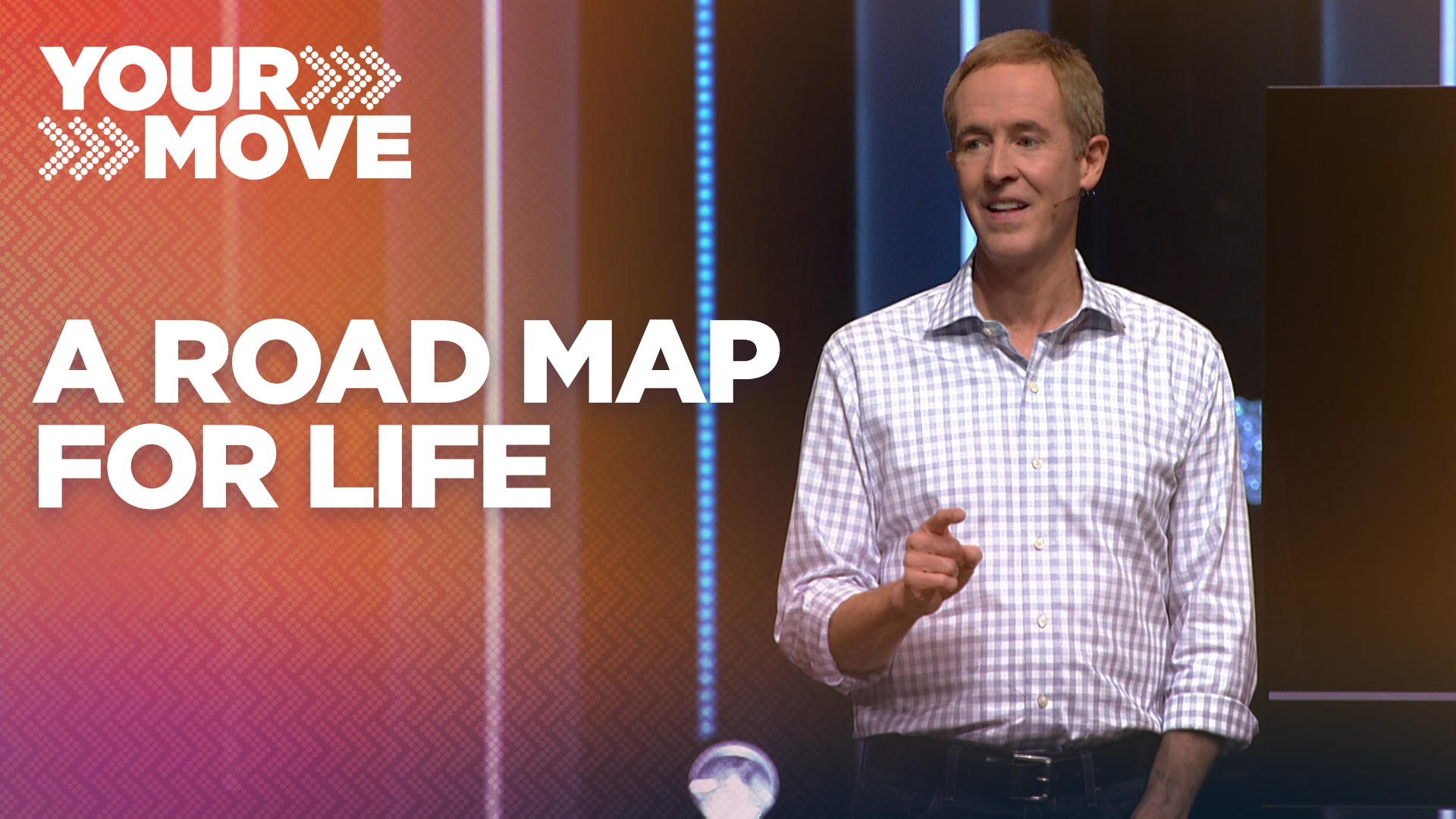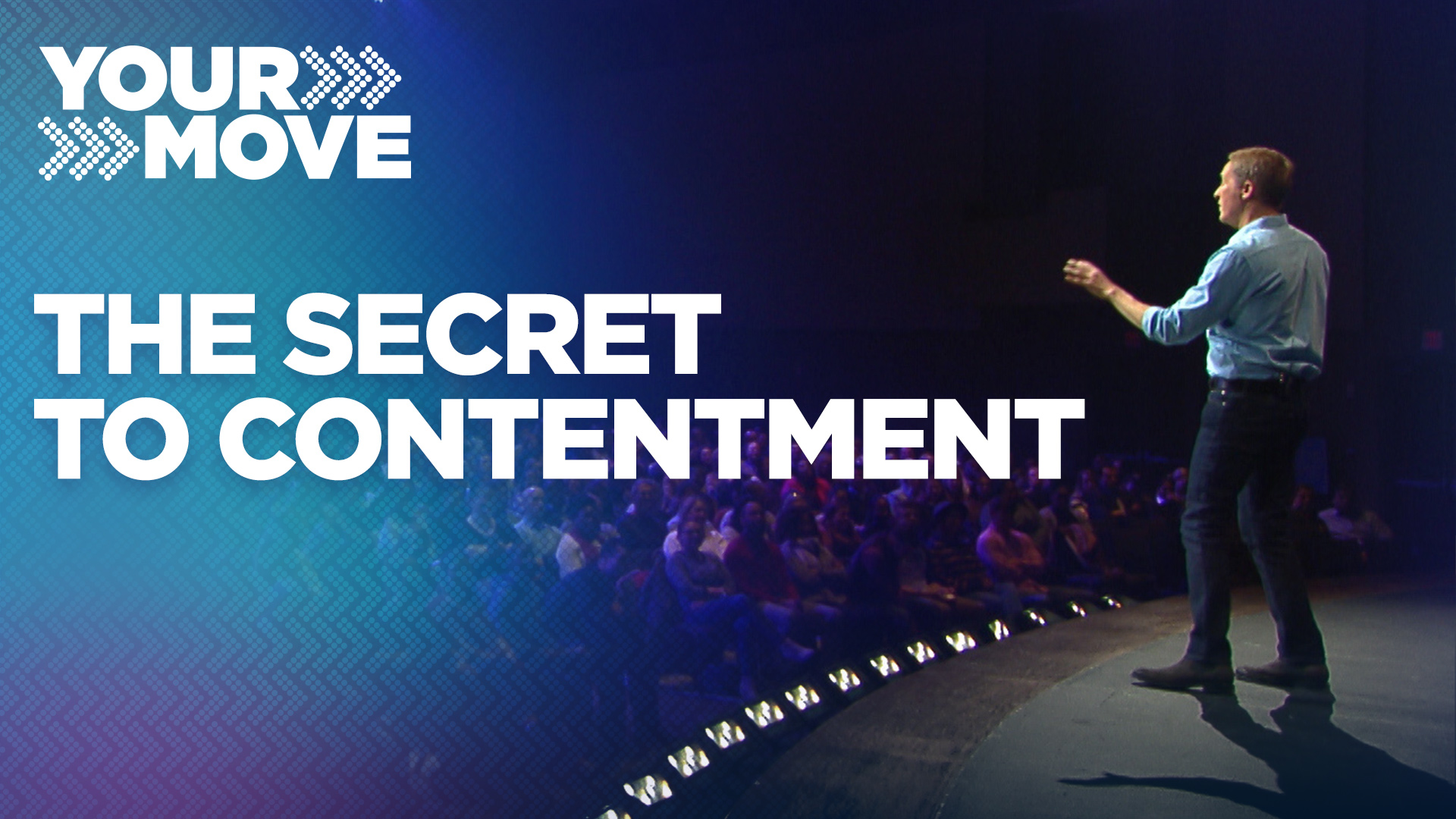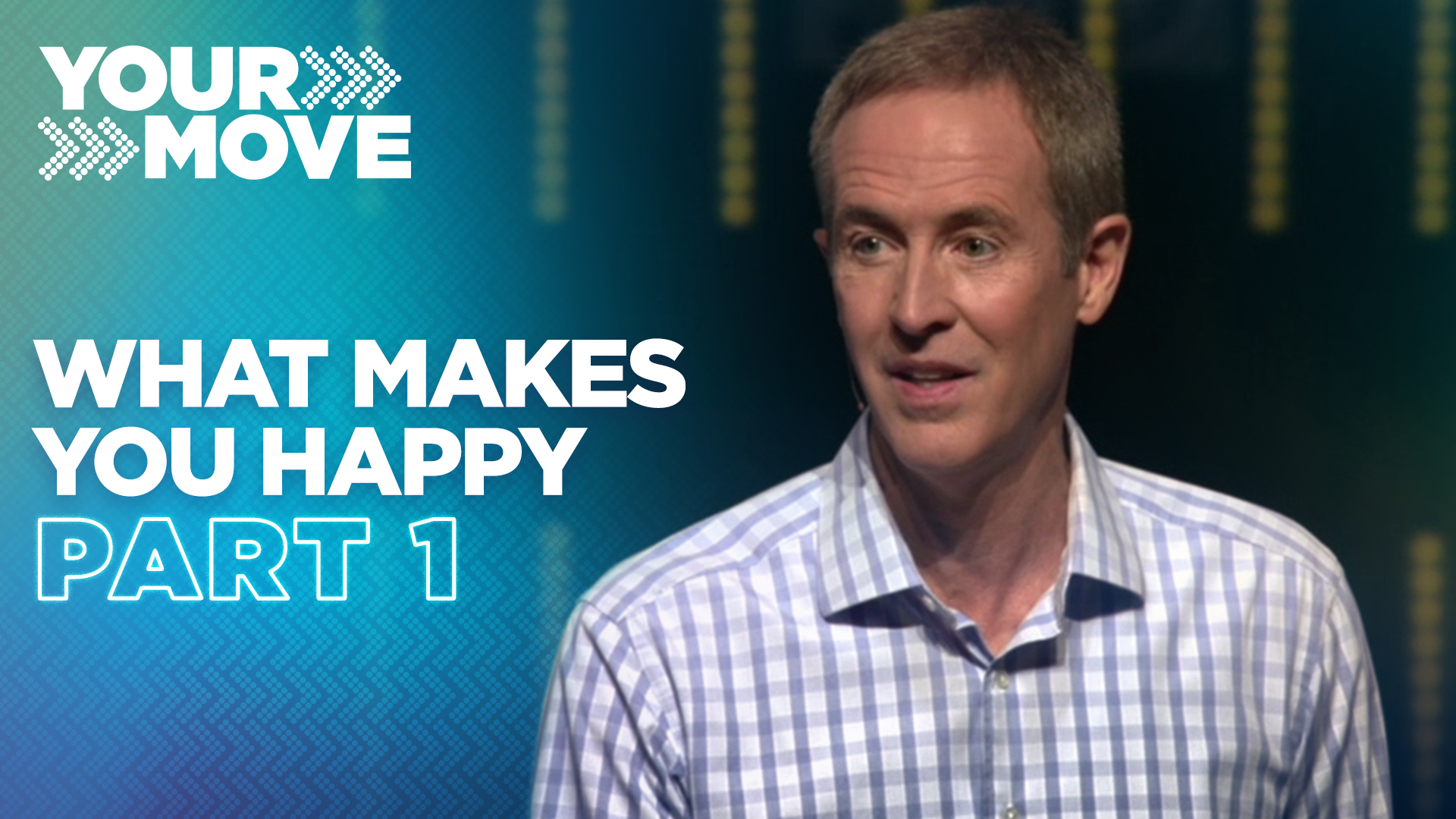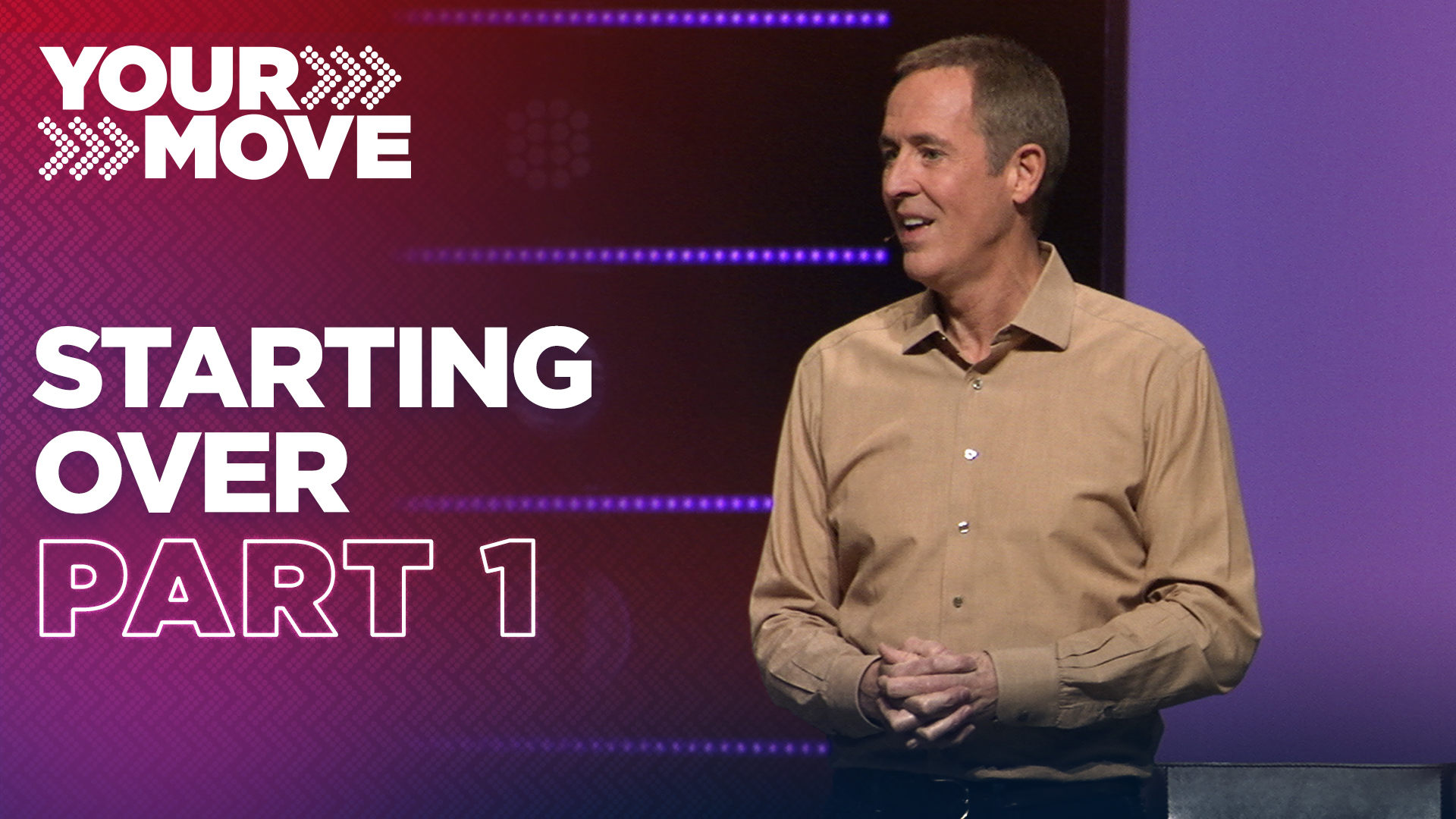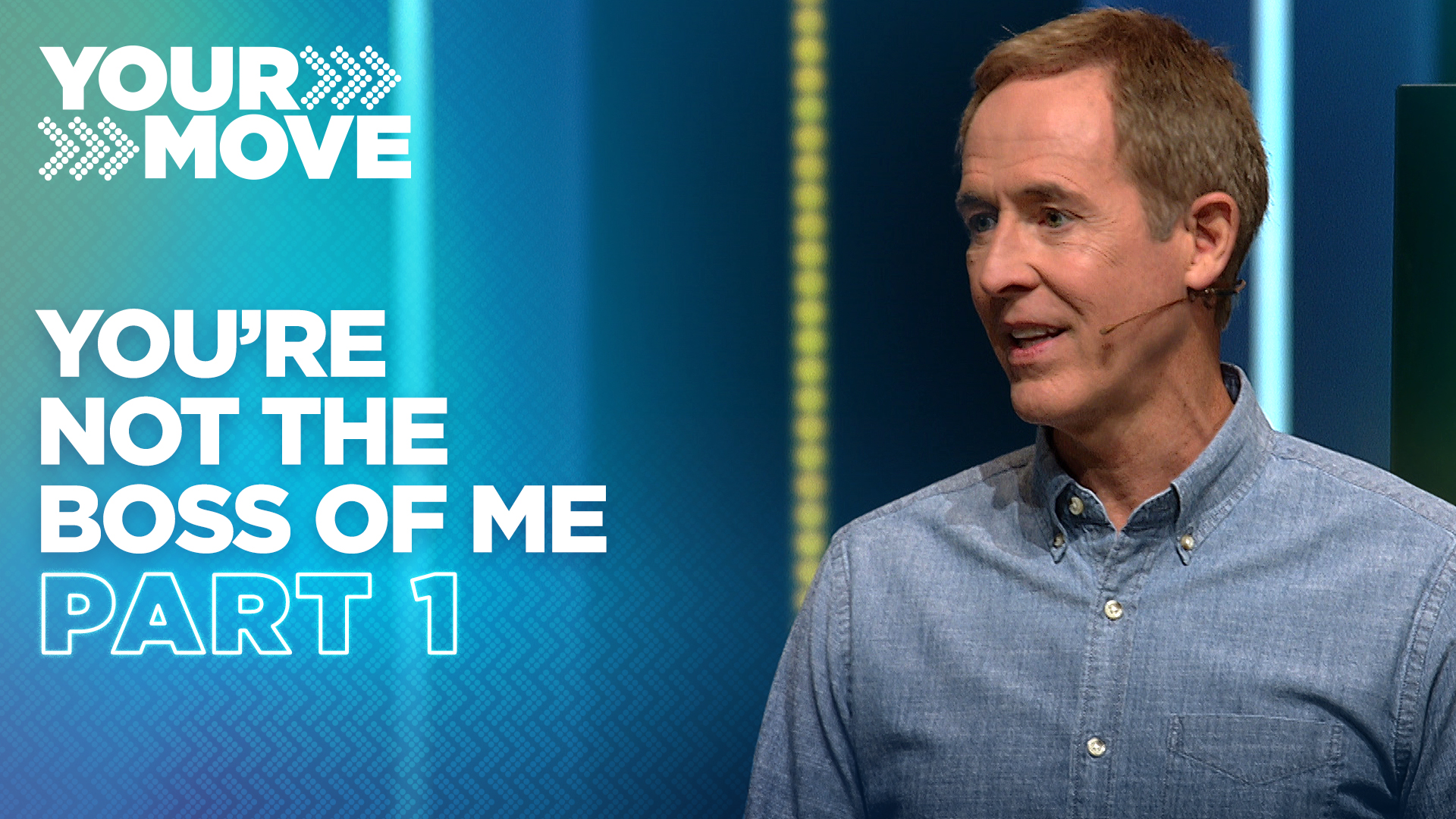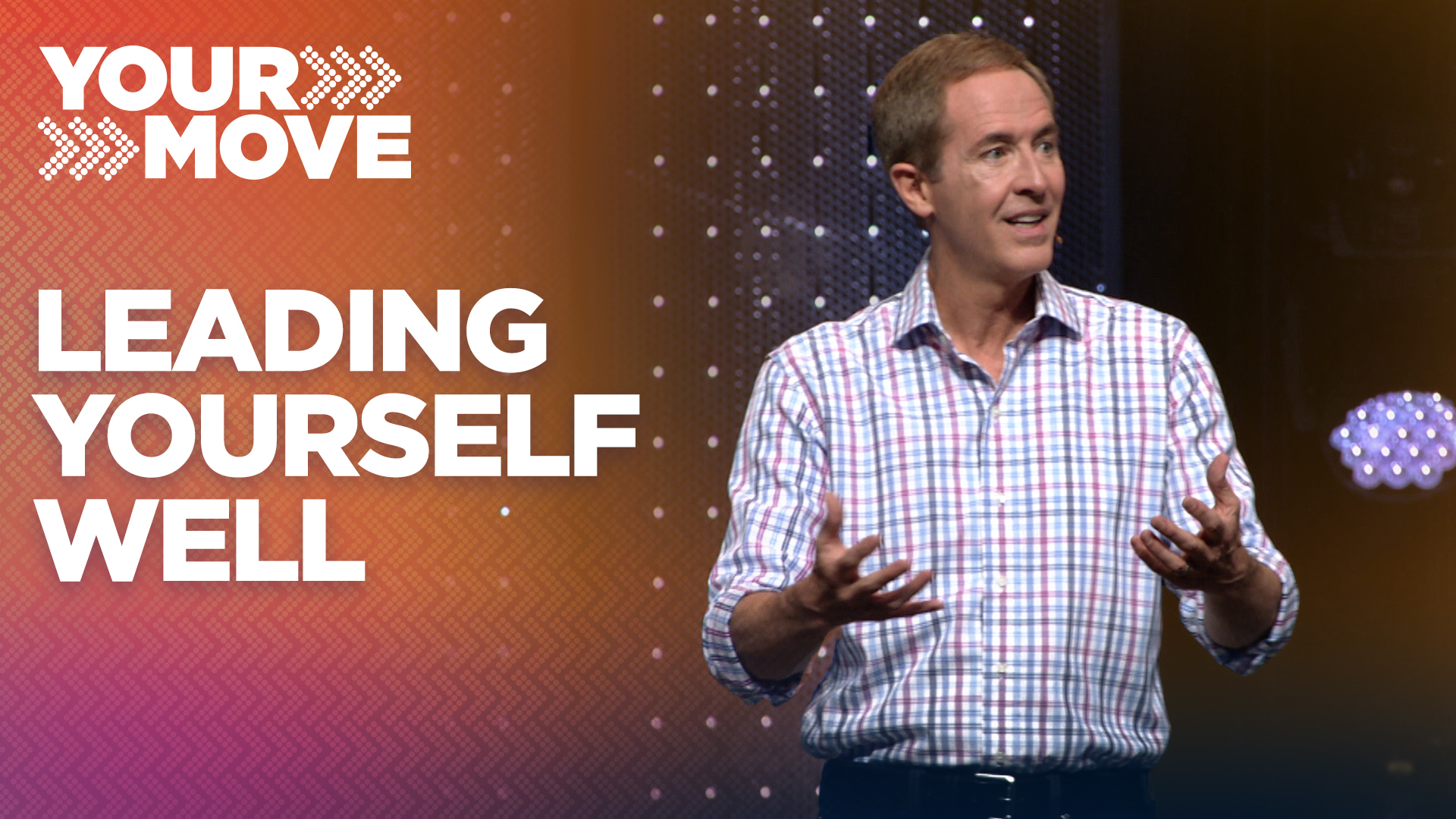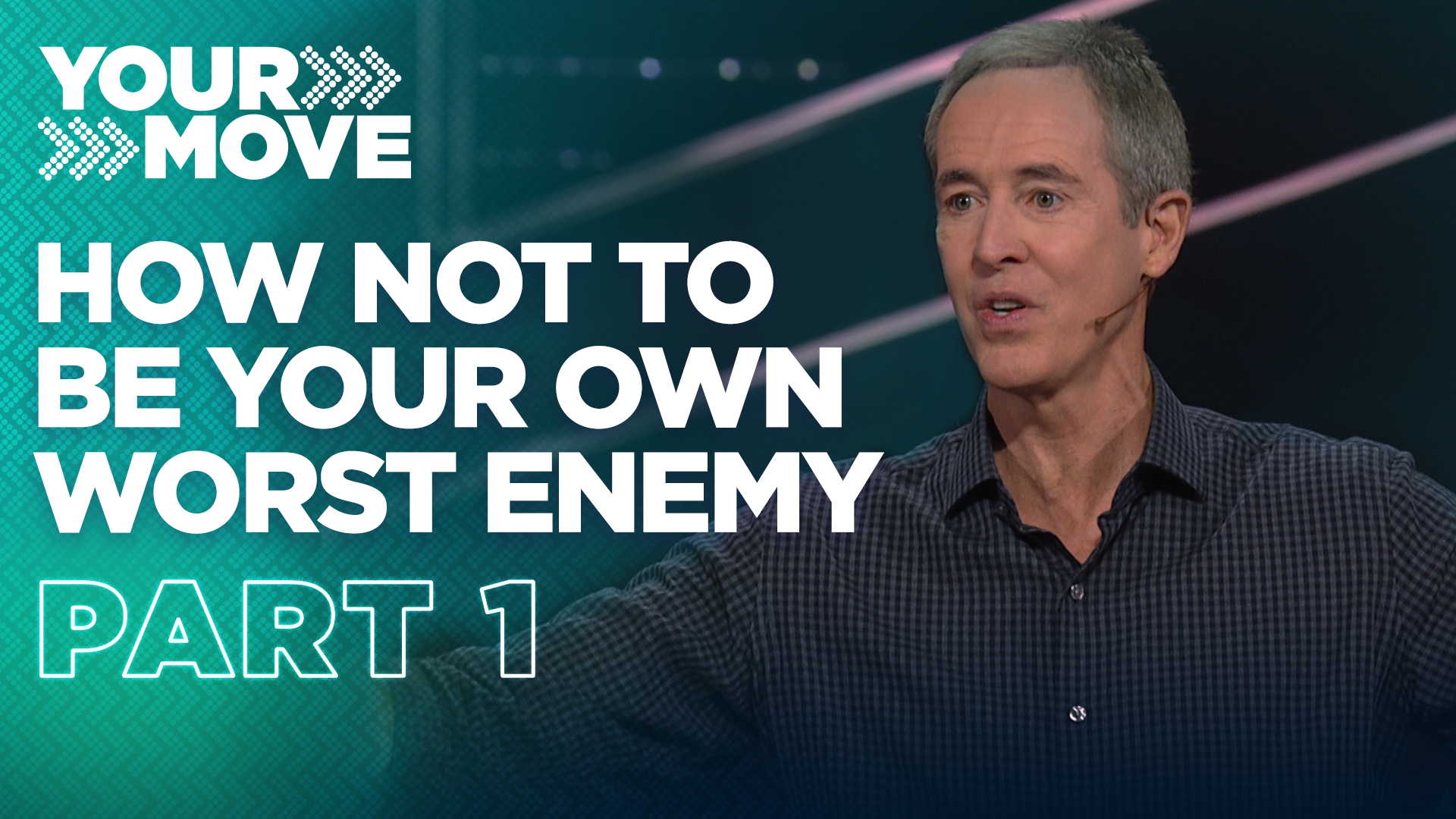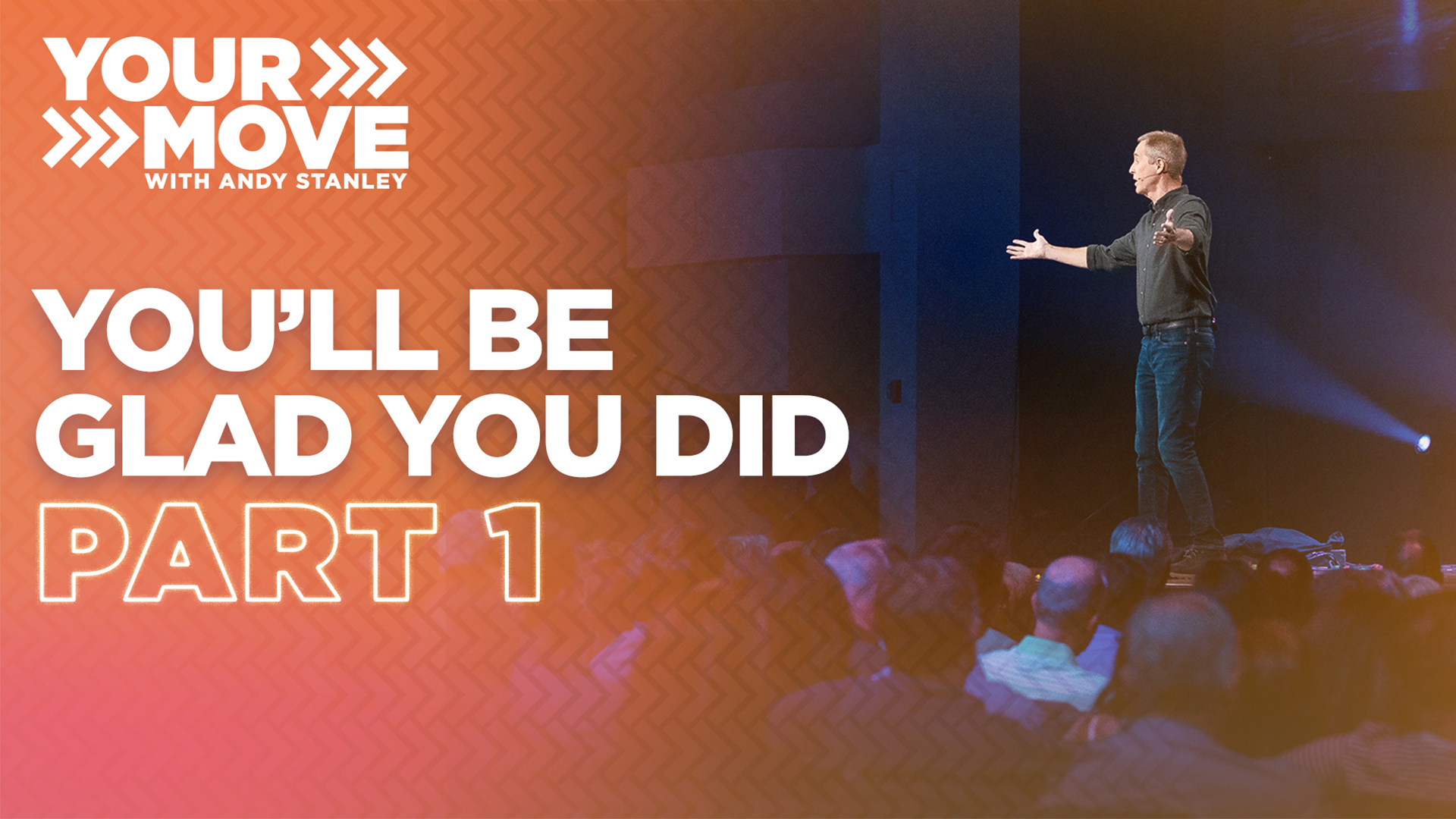It’s easy to make life all about ourselves. In this episode, Andy explains why life is much better when it’s lived for a greater purpose.
1. It’s easy for us to agree that we can’t find happiness through money, possessions, and status. Why is it so difficult for us to live as though that is true?
2. During the message, Andy said, “You were designed to live with open hands.” Is this difficult for you to believe? Why or why not?
3. Is there a way you need to serve others or a place you need to volunteer? If so, what is one step you can take this week toward serving or volunteering? How can this group support you?
NOTE: The following content is a raw transcript and has not been edited for grammar, punctuation, or word usage.
What makes you happy?
No thing.
That’s right. No thing makes you happy. We said in week one that no thing makes us happy, nothing makes us happy. That happy always includes a who or two that you can’t be happy without some sort of healthy relationships. You were designed to be in community. We’re gonna talk a little bit more about that later on. And then the second question, again the same question with the second answer, “What makes you happy?”
Sowing.
That’s right, sowing. Jesus taught us… This is really interesting. In week two, we saw that Jesus said that happiness is not immediately accessible. That it’s sowing and reaping. You sow your way into happiness. That happiness is an outcome. Happiness isn’t something you can just go out and do. Happiness is an outcome. So essentially Jesus said, “When it comes to happiness, you’ve got to sow for it.” Now, as we wrap up this series, today we come to the most counterintuitive idea imaginable as it relates to happiness. In fact, this idea is so counterintuitive, if you have not experienced it, you will not believe it. In fact, if you’ve not experienced it, you’re gonna think I have some sort of agenda that I’m trying to push on you.
And the bottom line for today’s message is simply this, “As long as you are all about you, you won’t be happy.” As long as you are all about you. As long as it’s only about you. No matter what you have and what you accomplish, as long as you are all about you, you can’t, it’s not just won’t, you can’t be happy.
You can’t fulfill you. You need more than you have to offer. In fact, if you were to be able to somehow get yourself exactly the way you want yourself. If you were able to get yourself exactly the way you want yourself. The right size, the right income, the right car, the right everything. If you can get you exactly the way you want you, you still won’t be enough, you still won’t be happy. And this is so counterintuitive. Because we just think naturally that “If I could just get certain things, have certain things, live a certain way, have a certain health, have a certain look, have a certain whatever. That then, possibly, I’d be happy.” But the truth is, and we kinda know this, but today’s a big reminder for some of us. We kinda know this, you cannot acquire, consume, or even exercise your way to happiness. It’s impossible. You cannot acquire, consume, or exercise your way to happiness.
Now, this is so tricky, I wanna talk about it for just a minute, then we’re gonna move along. But, just to make sure we’re all on the same page. I want you to think about this. This is so deceitful. Here’s what we do when it comes to acquiring, consuming, and exercise. We look at, and I’m guilty of this, I’m not shaking my finger at you. We look at what other people acquire. We look at the stuff people consume, and I don’t just mean food, I mean just consuming things. And we look at the way that people look. And we tell yourselves, you know what? “If I could acquire that, If I could live that way, if I could have that, if I could look that way then somehow I’d be happy because I do what you do.” I look at you and you seem so happy, and you kinda got it going on.
If I had more of me going on the way you got you going on, then maybe I’d be happy. And my tendency and your tendency is to look around at a bunch of people who may not be any happier than we are. I mean, we all put on a smiley face for the most part, right? We look at a whole bunch of people doing a whole bunch of things, and we create what I call a composite person. Now, a composite person is… This is how a composite person works. I think, and I’ll just play along for a second, we’ll just blame me for a second. I think, “if I could have their house. If I could have his car. If I could look like him. If I could have that guy’s income. If I could have that guy’s kids. If I could have that guy’s kid’s education. If I can live in that city… “
And I look at about a dozen different men, and I pick and choose the highlights of their life, from their highlight reels, and I put them all together and I feel very discontent with my life. And suddenly, I’m unhappy. And I think, but if I could ever, and I’m not looking at any individual. In other words, there’s not probably a person on the planet that, if you could, you would push a button and you would suddenly be them. You just want a little bit of them, right? You would not push a button and suddenly have their parents as your parents. You would not push a button and suddenly your sister or your brother’s not your sister or brother, actually you might do that. Okay, you, in other words, there’s no one in the world that you would trade places with completely and give up everything that’s true about you.
But there are people that we would like to pick and choose from their life, right? We do this all the time, “Wish I had that. Wish I looked like that. Wish I could fit into one of those.” We all do that. So we create this composite person. We compare ourself to that person. And then what happens is, without meaning to, we get a little bit too focused, sometimes hyper focused, on becoming something we’re not. And I’m all about self improvement. And I’m all about exercise. I’m all about discipline, but when you become consumed with you, no matter how much progress you make, you become or continue to be unhappy.
Now, do you know what you call a composite person? You call a composite person Frankenstein. That’s what Frankenstein was, Frankenstein was a composite person. A composite person is a monster. The composite person that you’ve kinda pieced together with all these different people you’ve met and all these different things they have, they just don’t exist. So you cannot consume or acquire or exercise your way into happiness, because all of your consuming and all of your exercising and all of your acquiring is in comparison to other people who may not be happy either.
In fact, this would be the biggest surprise. Some of them actually look at you and look at what you have and what you wear, and where you live, and who you date, and where you go to school. And you’re looking at them, and it’s just crazy. But at the end of the day, even if you were successful at becoming the composite person, you wouldn’t be happy, because you cannot, acquire and consume and exercise your way to happiness. But… And here’s the thing that you’re gonna have a hard time believing and I have a hard time believing it when I just look at it on the surface. You may not be able to acquire and consume and exercise your way to happiness, but actually you can serve and volunteer your way there.
Now, before you get up and leave and lay on me some sort of agenda that I don’t have today, this is an amazing, amazing, amazing thought and some of you know this because you’ve experienced this, and others, if you have never experienced this because you are so busy trying to consume and acquire and exercise your way into a happiness that you’re never ever, ever going to get to.
If you don’t believe me today, just go home and get on your computer, and you will find there is research, after research, after research, after research, all over the world and lots of different cultures asking the question, “Is there a connection between happiness and selflessness? Is there a connection between,” get this, “Health and selflessness? Is there a connection between happiness and health and volunteering?” And what you’ll discover is that project, after project, after project, they’ve all come to the same conclusion. There is actually a connection, not just… Not a covert, but very overt connection between people’s happiness, people’s health, and their willingness to be selfless.
One of the first projects I looked at was a University of Chicago Project where they asked the question, “What are the most fulfilling jobs or what are the most fulfilling careers?” And they’ve made a list of the most fulfilling jobs and the most fulfilling careers or the most satisfying jobs, and here’s what they came up with, they put them in categories. Here they are: Jobs where you care for others, teach others, protect others, or creative pursuits. The top… The most happy, most satisfying jobs… And they discovered, there was no income associated with job satisfaction or happiness once a person reached the point where they could basically pay the bills, eat, and live indoors. That as they added more and more and more income, there was not more and more and more happiness. That happiness, job happiness, was found within careers where you cared for other people, taught other people, or protected other people. And I threw this one in there, because I just wanted to put all the top four in there, creative pursuits, music, art, photography.
Then there was another study, this was even more amazing. In the UK, they took 40 different studies… 40 different studies that asked the question, “Is there a connection between happiness and selflessness? Is there a connection between happiness, health, and selflessness or serving other people?” They looked at 40 studies that had been done over a period of 20 years. And here’s the link they found between those three ideas, here it is: Volunteering, health, and happiness. If you volunteer… And these studies, this wasn’t like, “I volunteered once one time back in… ” This was people who had a lifestyle of carving out time to volunteer somewhere in their community or somewhere in their church or somewhere in their lives. And here’s what they discovered over and over, 20 years’ study, less depression, less heart disease, less stress, and this was amazing, for teenagers… For teenagers who systematically volunteered somewhere, far less drug abuse and far less unplanned pregnancies. And in this study, they said, “Even if you have to force your teenager to volunteer, force them to volunteer. That volunteering with a bad attitude still has positive results.”
[laughter]
And if you have teenagers, you’re like, “Well, they have a bad attitude about everything, so that doesn’t come as any surprise.” Right? They said… And they said this, “Teenagers who volunteer ultimately, generally volunteer as adults and consequently have all these benefits.” On the flip side, people who volunteer, who find some way within the course of life to be selfless, have a greater psychological well-being. They’re just healthier mentally. They’re healthier physically. They have higher self-esteem. They live longer and they have a better quality of life.
Now check this out, this is hard to believe. Clinical research shows, I’m not making this up… Clinical research shows that volunteering and mentoring, pumps up your immune system. Do what? Volunteering and mentoring, some sort of weekly or every once in a while, a couple, three times a month, selfless activity, actually increases your ability to fight disease.
Now, how can that be? Because my natural inclination and your natural inclination is to acquire and to consume and to try to look my best. To acquire, to consume, and to try to look my best. And yet, research all over the world, asking different questions with different groups of people, all come to the same conclusion, that one of the best things you can do for yourself is not focus so much on yourself. That selflessness leads to happiness. That selflessness leads to a better sense of well-being and, ultimately, to better health. Now here’s the question that we’re gonna ask and try to answer for the next few minutes. How… Because this is not intuitive. How can behaving selflessly make myself happier? I mean, how is it that behaving selflessly can actually make myself happier? How can… Or we can ask it this way, how can emptying myself leave me feeling so full?
And the answer is two little words: Divine design. This is how you were created to be. You were created by your creator, God, to live with open hands. You were created by God to do all those New Testament one anothers. That you will thrive, that you will be happier, you will be healthier if you embrace all those New Testament one anothers that we tend to naturally resist. The one anothers, love one another. Care for one another. Serve one another. Forgive one another. Carry one another’s burdens. You just one another, one another. You were designed by God, you were created by God to one another one another.
You do better and you are happier. Now, here’s the thing. Selfishness, nobody has to learn how to be selfish, right? We’re born selfish. Selfishness comes naturally, but selfishness was not part of your divine design. If you wanna be happy, you have got to find a way to give yourself away. You will never ever be happy as long as it’s about you even when you become the best possible version of you possible.
And again, you don’t need to look any further than the happiest people you know. Because some of the happiest people you know are also some of the more selfless people, and you wouldn’t wanna look like them because you exercise far more than they do, but you’re upset all the time and they just seem to be happy and you wouldn’t want their income because they don’t make as much money as you do, but they seem to be at peace with what they have and they’re at peace with what they don’t have and you’re striving and you’re frustrated and you’re mad all the time. And you look at things in their life that you wouldn’t trade with but they’ve got something you don’t have. When you scratch beneath the surface, they have found a way to give their life away. Happy people find a way to give their life away. Now, the apostle Paul in a letter to these Christians that lived in Galatia, a Roman province, in the first century, because he’s writing to Christians, uses some Christians words and some theological terms but instead of getting lost in the theology today even though these are very rich verses, I just want you to look really at two approaches to life that he talks about and two lists of things that he associates with each of these approaches to life because herein is the stark contrast between living for myself, trying to fill myself up and make myself happy, as opposed to pouring myself out and finding happiness. Last week, we talked about pleasure, remember that? And we said if you prioritize pleasure over happiness, you’ll have neither. But if you prioritize happiness over pleasure you get both.
And once again, the apostle Paul points to that idea that again it’s not intuitive, but you live long enough and you begin to realize just how true it is. So here’s what he says. We’re gonna drop in right in the middle of the discussion, which is a little dangerous to do, but we’ll just see what happens. Here’s what he says in Galatians Chapter 5. He says, “The acts of the flesh are obvious.” Now, if you’re a Bible person, you’ve probably read this verse or heard this verse before. If the New Testament is new to you, this little Greek word ‘flesh’, in other translations, it says the sinful nature.
So when Paul says, ‘The acts of the flesh or the acts of the sinful nature’, he’s saying, if you were just to do whatever you wanted to do, if you were able to get by with anything and there wouldn’t be any consequences and your wife would never find out or your husband would never find out or your kids would never find out or it wouldn’t come back to haunt you, if you were to just go with your natural impulses and just do what you wanna do, when you wanna do it, with whom you wanna do it and you were never gonna run out of money, if you just kind of went with you, if you decided it’s all about me, he says, here’s what they are. The acts of the flesh are obvious. He says, “I don’t even need to list them because we already know what they’re gonna be, but he says, “I’ll list them any way.”
The acts of the flesh are obvious, sexual immorality, impurity, debauchery, that’s just excessive sexual behavior, idolatry. Idolatry is basically trying to get the Gods to do my bidding. That’s what idolatry is. Some of us, even as Christians, pray sort of idolatrous prayers. “God, what do I need to do to get you to do what I want you.” It is idolatry. Witchcraft, simply trying the harnesses that harness the forces of nature to do my bidding. Hatred, discord, jealousy, fits of rage, selfish ambition, dissensions, factions and envy, drunkenness, orgies and the like. He says, “If you were just to pick your feet up and just kind of go with the flow of society and go with the flow of yourself and go with the flow of your natural inclinations, that’s what it looks like.” And here’s the synopsis of everything in those two verses, and this is so important. This is pleasure at someone else’s expense. This is always pleasure at someone else’s expense. When you give into your selfishness, it is pleasure for you at someone else’s expense. Someone always pays the price when you give in to your natural selfish inclinations, even when you get by with it, even when you don’t get caught, even when no one holds you accountable, somebody suffers. Pleasure at someone else’s expense. Why?
Because all the things that have to do with the acts, with the desires of the flesh, are all associated with, this is so important, they’re all associated with appetites. They’re all associated with appetites. And appetites, as we’ve said in the past, are never fully and finally satisfied. When you feed an appetite, it what? It grows. That’s right. When you feed an appetite, it grows. And when you can’t satisfy an appetite, you become frustrated, you become angry. So the apostle Paul, the apostle Paul says, our sinful nature, our flesh, our selfishness, just giving in to whatever I want. If you say yes to that long enough, as hard as you try to fill yourself up, it will leave you wanting more. It’s an appetite that is never fully and finally satisfied, whether it’s an appetite for sex, an appetite for stuff, an appetite for recognition, an appetite for getting the credit you think you’re due. Whatever it is, those are appetites that are never fully and finally satisfied. And if you give yourself to those appetites, you just end up frustrated, not happy. He says, “But,” then he contrasts it. He says, “But the fruit of the spirit, the fruit of the spirit,” and look at the contrast, fruit of the spirit, acts of the flesh. Fruit of the spirit, acts of the flesh.
The fruit of the spirit refers to when you finally say… The apostle Paul says, “The fruit of the spirit versus the acts of the flesh.” Now here are the fruit of the spirit. It is the fruit of the spirit that is when you finally relax and say, “God, it’s not all about me. God, it’s not all about what I can get. It’s not all about satisfying. God, it’s about you and it’s about others.”
He says, “the fruit of the spirit is love, joy.” Love, joy, peace. This is forbearance means patience. I’m gonna go with your patience, not mine. Kindness, I’m gonna gear down so that you’re comfortable. Goodness, I’m just gonna do the right thing even if it costs me. Faithfulness, you can trust me, you can trust me, you can trust me. Gentleness, I’m gonna leverage my power for your benefit, and self-control.He says, this is what God is going to produce through you. And then, one of the most brilliant statements of all ancient literature, one of the most brilliant statements in all of the New Testament, this next statement is so powerful. Here’s what he says, “Against such things, there is no law.” I’m telling you, this is one of the richest statements you’ll ever read.
Let me go ahead and put the list up here. Here’s why I say that, look at this. Here’s what Paul say, Paul is saying, “You were made for this. This is the environment in which you flourish.” Imagine a family, imagine your current family, characterized by love, joy, peace, patience, kindness, goodness, faithfulness, gentleness, self control. Imagine a family characterized by those things, would you be happy? Yes, you’d be happy. And Paul is sayin’ “The reason you intuitively know, wouldn’t that be great?” Is because you were designed for this. You were designed to live in a community of people in your physical community that’s characterized by these characteristics. This is a community where the police basically direct traffic, and they have to talk people into going because they wanna wait for the other person to go first.
This is a community, imagine, this is a community, this is why what Paul said is so brilliant, this is a community where there is almost no need for any law, because if I’m for what’s in it for you, and if I’m committed to what’s in your best interest and you’re committed to what’s in my best interest, then we can get through anything. We can figure anything out, we can solve any problem, we can all sleep at night without any fear. And if you can just imagine that within your family or imagine that within your community, or imagine that in a nation, can you just sense where the stress level and the anxiety level would begin to decrease? Can you just sense or imagine how much happier you would be? Your family would be? Our communities would be? Our nation would be?
Paul says “This is what you were created for.” You were made for this. Listen, selfishness is natural, selfishness is natural, but it is not by design. Selfishness comes naturally, but it is not by design. You were created to live a life characterized by these things. Family works better when characterized by these things. Communities work better when they’re characterized by these things, and nations work better when they’re characterized by these things. And the apostle Paul says “I’m inviting you into a selfless way of living, and it may not be intuitive, but the more selfless you are, the happier you will be.” You need more evidence? There’s a question for you, more evidence.
How do we measure the value of a life? How do we measure the value of a life? Let me just make it real clear. So you’re at a funeral and somebody stands up to speak about the deceased, Here are some things they never talk about. How immoral they were, impure, indulgent, hateful, jealous, angry, selfish, argumentative, envious and how much, how often they got drunk. You never talk about that kind of stuff. You never say “You know what? I’m tellin’ you, this guy made such an extraordinary contribution to our community. He slept with every woman he could get in the sack with. He was angry all the time, he was jealous. He was so selfish, envious, and when he wasn’t drunk, he was asleep. We were just all inspired by his life.” These are the things we never bring up at the end because we know intuitively.
These things have no value, they make no contribution, listen, they are all consumptive. They are all pleasure at someone else’s expense. We know they add nothing to society, they add nothing to a life and no one whose life is characterized by these things is happy, and they don’t make the people around them happy, we know this. And yet every single day, I’m tempted just like you are to get up every single day and consume all of my time and all of my life on me in an attempt to be happier, and more fulfilled. And our Heavenly Father just puts His hands on His hips and shakes His head like “Okay, when are you gonna figure this out?” Selfishness is natural, but you are not designed for selfishness. Selfishness ultimately will kill you.
The value of a life is always measured by how much of it was given away. That’s what we celebrate. That’s intuitively what we know is most valuable. Listen. Giving your life away is what makes you great. When a person gives a portion of their life away, when they live a selfless life, we look at that individual, and we think “That was a great man. That was a great woman.” And you know what else is true of them? They were so content, they were so happy. Somehow they discovered the secret that pouring out is what fills an individual up. If you want to be happy, you gotta figure out a way to give your life away, if you want to be happy.
And I don’t mean twice a year you go on some kind of thing ’cause your office has some kind of thing and you gotta go ’cause the boss is there lookin’ to make sure everybody’s there. No. You’ve gotta find a way to systematically give your life away just like you systematically consume, just like you systematically exercise, just like you systematically look in the mirror 25 times a day to make sure you got it goin’ on. You’ve gotta find a way to systematically give your life away. One more illustration, okay? Don’t be this. This is a picture of the Dead Sea. Now most of you know the Dead Sea is dead because the water comes in, but no water goes where?
Out.
Out, that’s right. The Jordan River dumps into the Dead Sea, and it’s such a low place on the planet, all the water stays right there. Everybody knows that; the Dead Sea is dead, nothing can live in the Dead Sea because water goes in, no water goes out, but here’s something you didn’t know. Check this next picture out. The Dead Sea is drying up as we sit here, they are pumping thousands and thousands of gallons into the Dead Sea to try to save the Dead Sea, and it is a mystery because about 80 miles, 87 miles north of the Dead Sea is the Sea of Galilee. Where people are water skiing and jet skiing and wakeboarding and on boats and fishing and it’s just a beautiful, beautiful, beautiful resort kind of environment all over the Sea of Galilee. But the Sea of Galilee has water coming in, the Sea of Galilee has water coming out, it’s a living, beautiful place. And that same water travels about 87 miles down to the Dead Sea and the Dead Sea is shrinking. Now tell me, how can the Sea of Galilee that has water going in and water going out survive, and how is it that a sea that has water flowing in and no water flowing out, how is it that it’s shrinking?
In fact, if you visit the Sea of Galilee, you can drive along several roads and hundreds and hundreds of yards to your left is the Sea of Galilee, and about 40 yards to your right are cliffs and they have lines up on the cliff saying, “That’s how high the Dead Sea used to be. It’s shrinking.” How can that be? How can it be that something that where water is pouring in and no water’s going out, how is it that it’s getting smaller? My friends, if you don’t figure out how to give your life away, you are the Dead Sea. It all comes in, nothing goes out, and you become smaller and smaller and smaller and smaller and smaller and more frustrated and more frustrated and more unhappy and more unhappy and more unhappy, and you will fall for the lie every single time. “If only I look like her, if only I’d married like him, if only I drove one of those,” and you begin to put together the composite person. And you think, “If I could ever, if I could ever become Frankenstein, I know I would finally be happy.” But you were designed by God to give your life away. You were made for more than you. It’s not intuitive, but it’s true. If, if, if. If it’s all about you, you’ll never be happy. You need more than you. Again, even if you get yourself exactly like you want to get yourself, yourself will never be enough. You cannot acquire, you cannot consume, and you cannot exercise your way to happiness.
And here’s why, then I’m done. Because you were designed, you were designed, you were designed by the giver of life to give your life away, you were created by the creator of life to give your life away, you were made by the maker of life to give your life away. You were created in such a way that you will never find fulfillment until you find a way to periodically dump out what’s inside of you for the benefit of somebody else. That’s where you find life.


